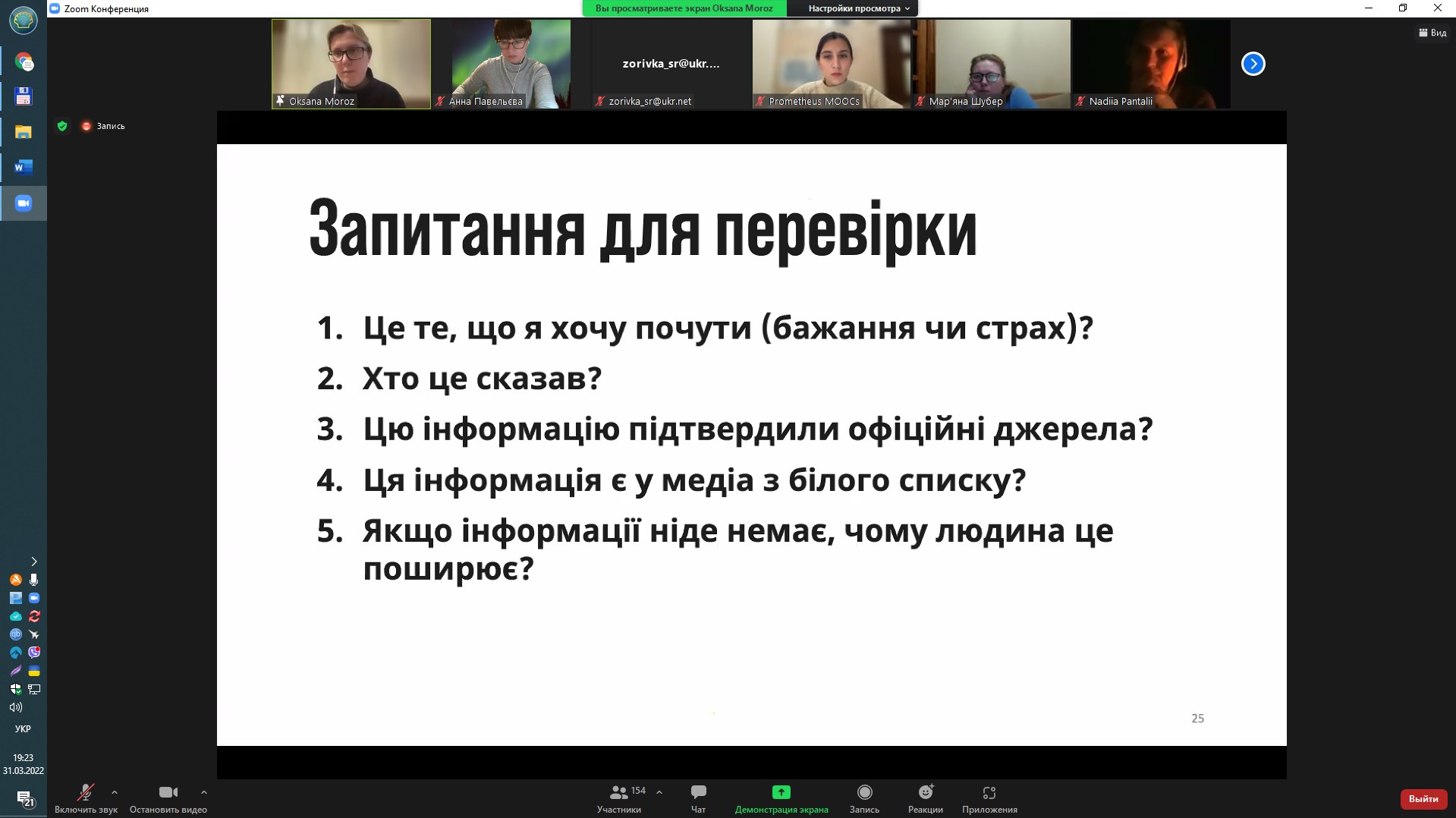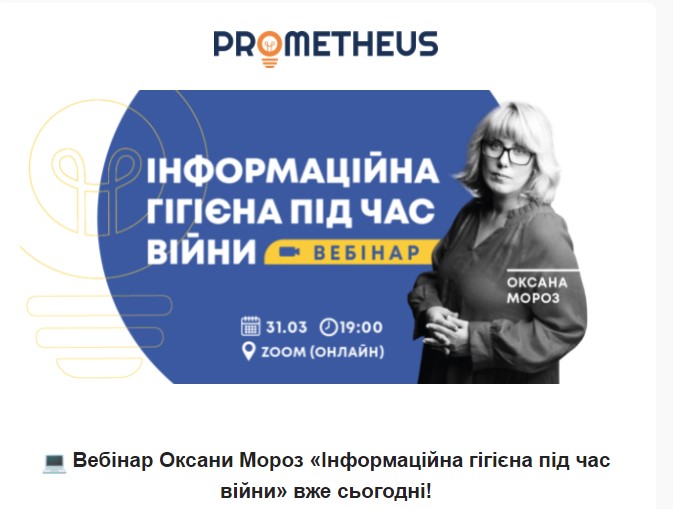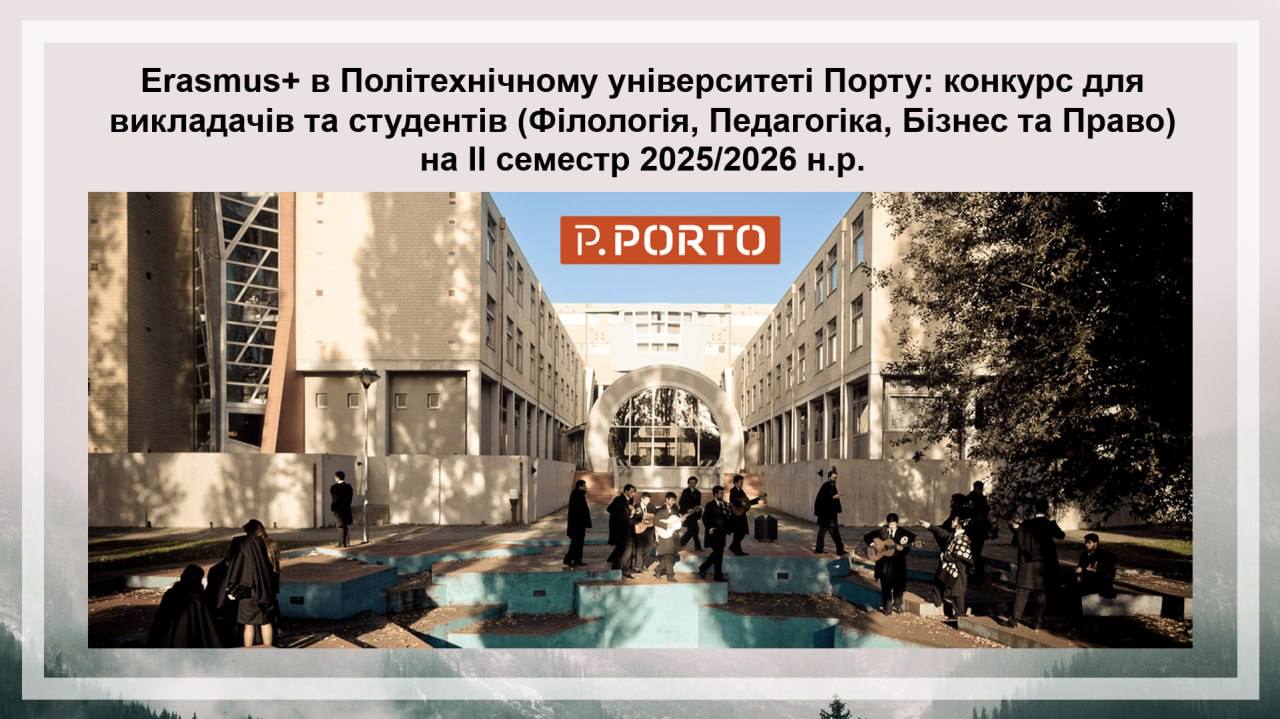On March 31, 2022, the guarantor of the specialty "035 Philology" (the level of higher education – "Bachelor") – Candidate of Philological Sciences, Associate Professor of Department of Germanic Philology and Translation Anna Pavelieva took part in Oksana Moroz's webinar "Information Hygiene during the war", organized by the largest online education platform in Ukraine – Prometheus.
Speaker Oksana Moroz is the founder of the information hygiene initiative "How not to become a vegetable", which specializes in the analysis and formation of the information field as well as the behavior of people in it. She also is a host of the radio blog "Believe or not to believe" on Radio "Culture" and the author of books "The nation of vegetables?" and "The Struggle for the Truth".
During the webinar, the following questions were considered: is there truth in the media now and how to find it; what the "white media" is and which international media cover Russia's war with Ukraine quite truthfully; why fakes are not the main weapon of the enemy; how we could be broken in the infospace or about the "information-psychological operation"; why participating in "trash talks" in comments is a work on the enemy (every comment or emoji (even "outrage") promotes the video and helps social networks to spread it, thus, it is better to refrain from liking or any comments of "enemy" videos), etc.
The media expert acquainted the audience with the algorithm of fact-checking in peacetime and wartime (official source – verification from their sources – expert comment – filter "dosed/appropriate" information) and advised to take information from Ukrainian "white" and professional media specializing in coverage of military affairs.



























The speaker explained in detail how the enemy works in the information space:
1) finds a rift in society (a "painful issue" that leads to disagreements in society, which is further used by the enemy to divide society, such as covid vaccination or language issues in Ukraine);
2) creates a blatant lie (a fact that must be so mind-blowing that no one could believe that one could come up with something like this at all) which will lead to disastrous consequences if people believe in it (for example, news about the development of biological weapons in Ukraine and the breeding of birds that will carry these ethnically labeled biological weapons);
3) adds a little truth – combines the truth with lies, arbitrary interpretation or subjective conclusions (for example, the words of the Prime Minister of Poland Morawiecki about Ukrainian refugees distorted by the Russian media);
4) "hides hands": Russians with disinformation create pseudo-Ukrainian pages on social networks, fake media, use pro-Russian activists/politicians to retransmit their manipulations, connect bot farms that massively spread lies or act even more brazenly – transferring responsibility to another country (as the Russian Federation constantly does, blaming the AFU for its crimes);
5) uses "useful idiots" – those who mindlessly perceive the Kremlin's messages and promote them among the target audience (the case of teacher Yevheniia Bilchenko and her anti-Ukrainian statements);
6) denies everything (the Malaysian Boeing downed by Russia or Russia's denial of the destruction of civilian infrastructure and numerous brutal murders and tortures of civilians in Ukraine);
7) "play long" – Russia seeks to conduct long disinformation campaigns and invest huge resources over many years, its system may not provide obvious benefits for a long time, and we will not see immediate consequences, however, it works on the accumulation system.
Also, on the example "temnyky" of ORDLO (temporarily occupied territories of Donetsk and Luhansk regions), the principle of creating Russian fakes (fake is always banal, nothing supernatural and even a little absurd; it contains a powerful message and at the same time leaves room for its own fantasies; the truthfulness of fakes is added by means of a binding to the terrain; fake is repeated many times, even for years) was discussed.
Separately, it was emphasized the importance of compliance with the rules of infohygiene. After reading the news, you should ask yourself 5 key questions:
- Is this what I want to hear (desire or fear)?
- Who said that?
- Has this information been confirmed by official sources?
- Is this information in the media from the white list?
- If there is no information anywhere, why does a person spread it?
The speaker also told how NOT to help the enemy: not to criticize the government; refrain from hating one's own people; do not disseminate emotional information; do not disseminate unverified information; do not spread panic; do not spread "betrayal"; do not spread doubts; do not interact offline or online.
In addition, Oksana Moroz told the participants of the webinar about the safety rules in social networks: before interacting (likes, shares, comments) – check/read; look for if there are bots. If there is, we check the information; conduct an audit of which pages the author is subscribed to; add to friends only after checking the information (and it is better during the war not to add anyone unfamiliar to friends at all); DO NOT add bots to friends.
We will remind you that students of Poltava Polytechnic presented a creative project in support of defenders.
Media Center of
National University “Yuri Kondratyuk Poltava Polytechnic”



